
Setting off for the Tuwa spring camp
N 51°39'155'' E 099°21'977''
Day: 279
Sunrise:
05:58
Sunset:
20:41
As the crow flies:
13
Daily kilometers:
20
Total kilometers:
1361
Soil condition:
Ice, snow
Temperature – Day (maximum):
2°C
Temperature – day (minimum):
minus 6°C
Temperature – Night:
minus 20°C
Latitude:
51°39’155”
Longitude:
099°21’977”
Maximum height:
1858 m above sea level
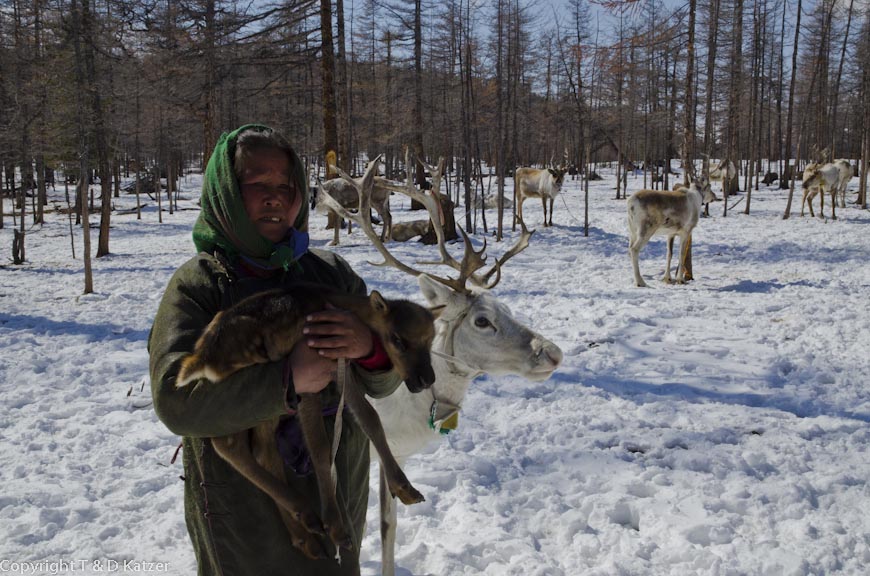
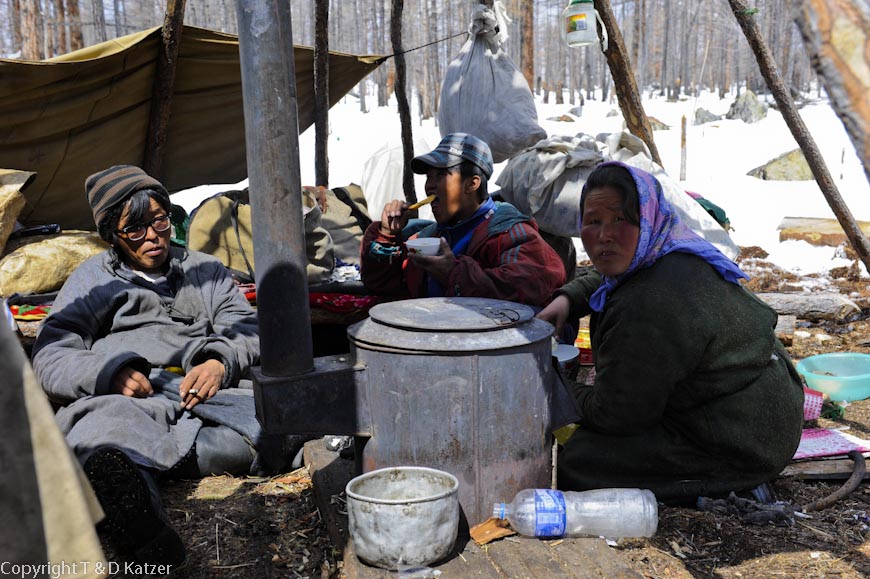



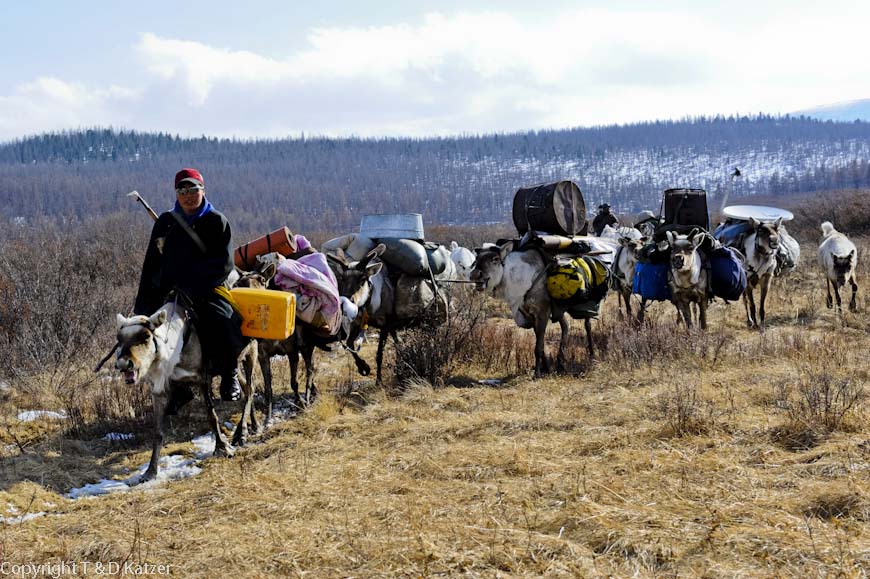
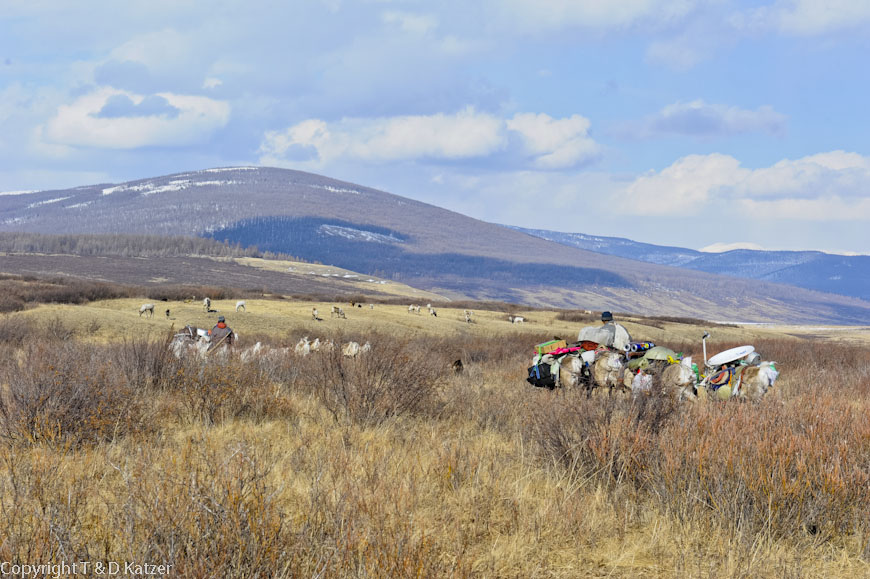

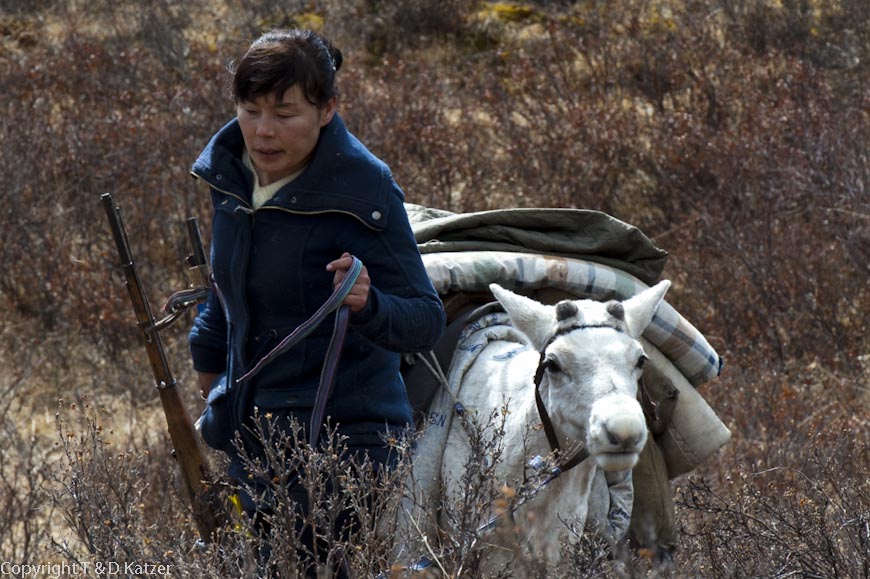
This morning brings us beautiful travel weather. As all the Tuva are supposedly leaving this place, we decide to go with them. Tanja will be the only one to stay behind and look after Naraa and Tuya. This means she moves into the bilge camp and stays there overnight. Actually, that would be a job for me as I don’t like to leave my wife alone in the taiga. As I want to document the move photographically and Tanja doesn’t feel up to it, we decide on this option. “A bear won’t eat me and there are no humans in this area. So no problem,” she says bravely.
After we have set up camp in the spring camp, Bilgee will ride back to the winter camp the following morning. He will let the horses rest there for a day. Then Tanja and Bilgee will join me with Naraa, the foal and the rest of the equipment. In order not to overload Tuya, Bilgee plans to complete the route in two days instead of one.
At 8:00 a.m. I start packing again. This time, I hope nothing comes up. The camp is a hive of activity. People are packing everywhere. Sansar and Black Boy cover Gambas Baisin with a black plastic sheet so that it doesn’t rain inside in summer. Bilgee arrives punctually at 10:00 am. As I don’t have to thaw any tent pegs out of the frozen ground this time, I’m in good spirits and ready to load the horses in good time. “What does it look like? Should we start loading?” I ask Tsaya. “No, we’re missing four reindeer. Ultsan has just ridden off to look for them.” I let my eyes wander over the wildly scattered belongings of our neighbors and ask myself how they are going to manage to load this mess onto the reindeer and horses today? Gamba is structured and organized as always in comparison. His animals are soon all packed up. Tso, Buyantogtoh, Mama and Galaa are also waiting in the wings. I walk through the camp where we have been living for almost six months and take photos of the Tuwa at work. Ovogdorj, Darimaa, Hadaa, his wife Sainaa and their baby Undraamaa left the camp days ago. The tent poles of the tepees stand deserted in the forest, rising up into the sky like skeletons.
At 15:00, the time has actually come. Everyone seems to be ready for the big move that has been talked about for so long. “Take care!” I shout to Tanja as Bilgee and I ride off first. “You too!” she replies, waving. As soon as we reach the edge of the forest, Bor trips over a tree trunk and falls. Its load, which weighs just 60 kilograms, is enough to press it to the ground like a louse. Bilgee and I immediately jump out of the saddle to free Bor from his burden. When he stands up again, we lift the bags onto his back again. “Dsügeer dsügeer” (It’s okay) says Bilgee when I ask if he can do it. Riding my horse Sar, I carefully lead Sharga and Bor along the narrow path winding through the dense forest. “Chchcht, chchcht, chchcht”, the panniers scrape past the still bare larch trees. Leaving the hilltop on which the winter camp is located, the route descends steeply in places. The horses slide over the snow. Bor stumbles from time to time but we reach an open high valley overgrown with waist-high bushes without further incident. I follow the track that the many reindeer hooves have pressed into the ground on the previous luggage trips.
After just an hour, the first nomads with their heavily laden reindeer catch up with us. I jump off my horse, pull my SLR out of my waterproof bag and try to capture the event. As I have to keep my horse and two packhorses, it’s not an easy job. Within a few minutes, most of the Tuwa have ridden past us. Saintsetseg carries a baby reindeer in her deel. She laughs cautiously at me as she trots past us. Gamba looks cool in his new sunglasses. He also laughs into the camera and seems to be wholeheartedly looking forward to transporting the last load into the new camp with this ride. Tso jumps off his stag to straighten a slipped satellite dish. Then he walks a few meters to pull the loaded reindeer train behind him. Due to the weakness of our horses, we can only follow slowly. The ground is partly slippery from the thawing snow. Bor keeps slipping and falling. After just 10 kilometers, we unload the horses and take a 30-minute break. Now Tsaya and Ultsan also arrive on horseback. Bilgee helps our neighbor to tie up his 40 kilogram stone drill, a large solar panel, the Russian saw blade we gave him and some reindeer antlers on the back of his packhorse. Then he rides on in a hurry so as not to miss the connection. Bilgee and I are now the last ones.
A cool wind blows dark snow clouds over a mountain flank. We cross a river whose ice just about carries us. At 9:50 pm we recognize the first columns of smoke rising from the roofs of the tipis in a narrow, long valley and uniting with the approaching night. It goes over uneven, slippery terrain. Boron falls again and stays down. We unload him, help him to his feet and lift the panniers onto his back again. “Hang in there. You’ll make it soon. There’s good food over there,” I say quietly.
It is pitch dark and very cold when we reach the Tuwa valley at an altitude of 1,858 meters. “We should look for Ultsan and Tsaya’s tipi,” I suggest. “Ügüj, (no) we need good feeding grounds for the horses. That’s much more important,” says Bilgee. Although I’m worried about having to move our camp again in the next few days, I give in, dog-tired. By the light of our headlamps, we unload the horses and look for a reasonably straight and elevated spot for the tent. Small rivulets flow all around us and water gurgles through a half-frozen stream about a hundred meters away. We are obviously in a damp valley. “It’s good here,” I say, pointing to a spot where there is a lot of snow but which seems to be safe from the meltwater. We clear away the snow as best we can and erect our large tent. Because of the frost, it is once again a challenge to hammer the tent pegs into the ground. While Bilgee pegs the horses, I boil hot water on the gas stove for a ready meal. Afterwards we have a hot cup of tea and at midnight we crawl into the sleeping cabin of the tent at minus 20°C. Bilgee wraps himself in his two sheepskin blankets while I slip into my expedition sleeping bag. As I was too tired to boil hot water for my hot water bottle, I don’t get warm, so I don’t close my eyes for most of the night. I think of Tanja and hope she has a better night than I did.
We look forward to your comments!

